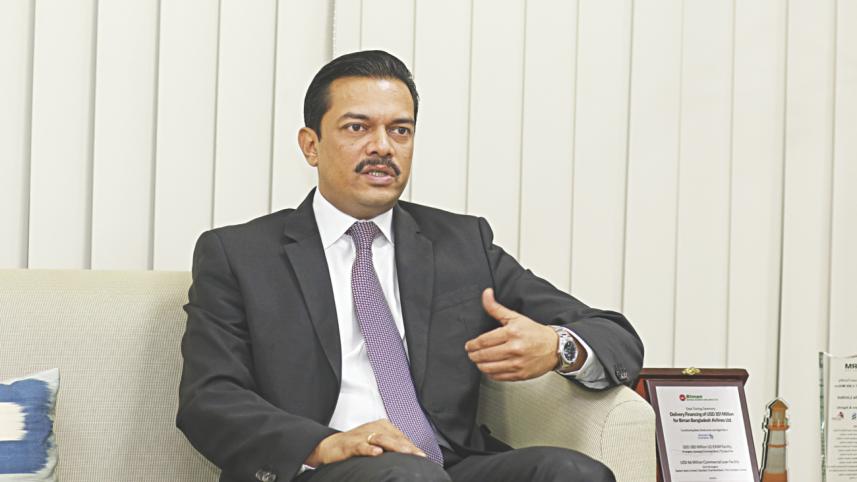Bangladesh poised for a big leap

Bangladesh has put all the right regulations in place in recent years to attract foreign investors and raise the vast amounts of funds needed to upgrade its infrastructure, said a leading banker.
“From the regulatory point of view, I think we have got all the details in place,” said Abrar A Anwar, chief executive officer of Standard Chartered Bangladesh.
The Asia-focused British bank is among the largest foreign investors in Bangladesh. And now, it is channelling its efforts to bring in more of its ilk, by communicating its overwhelmingly positive experience.
“Every year we are increasing our investment -- what does it mean? It means we are comfortable.”
Since 2012, the bank has been the headline sponsor of the Bangladesh Investment Summit, a daylong event held every year in Singapore or London to showcase the money-spinning opportunities that are waiting in the country.
This year, the annual event took place last month in the Asian financial hub, Singapore, and the 46-year-old banker is very satisfied with the outcome.
“The summit went well -- we think it was a very successful event. Now, we need to work on the next one.”
The main reason behind the annual event, the career banker said, is that the outside world does not get to hear the actual story of Bangladesh, which is that the underlying fundamentals are improving and opportunities in various sectors are emerging in line with the accelerated economic growth.
This is a good platform for successful entrepreneurs to talk about what they are doing and what they are planning to do, and how global investors can come and take part in it, he said.
International investors are progressively becoming aware of Bangladesh, as the country is being rated regularly with an overall stable outlook.
“How do you bridge the gap between this awareness and bringing in the real transaction? That's what we try to facilitate.”
The organisers gather questions from investors on various issues, ranging from policy to regulatory regimes, and convey them to the regulators and the policymakers in Bangladesh.
When the regulators and policymakers look at them, they ruminate whether the changes are feasible given the macroeconomic fundamentals.
The investors' concerns are already being addressed tangibly, Anwar said.
In 2013, when the first summit took place, a lot of private equity firms said that they were not investing in Bangladesh because of concerns over the exit policy. “We worked with the regulator, and there have been some regulatory changes on that front.”
The same happened in case of treasury bond investors. Earlier, there was a lock-in period that prevented easy exit. The kerb has now been lifted.
The regulators are proactive and go out happily to face the questions of foreign investors at the summit and then respond, he said.
They are frankly admitting where problems exist and are showing their firm commitment to overcome them.
The investors also want to know whether Bangladesh is a regular visitor in the international capital market, Anwar said.
There have been a lot of talks about sovereign bond, but the government has some problems with its issuance.
SCB is exploring the possibility of issuing quasi-sovereign bonds, such as a power bond, an energy bond or a port bond, to cater to projects for a particular sector.
“If we can come up with solutions then outsiders will think that Bangladesh is serious.”
If the country cannot offer any deals to international players, then investors will think that there is no regularity of opportunities here.
“The more products we offer, the more buyers will be interested in Bangladesh.”
The infrastructure bottlenecks also offer immense opportunities to the investors, according to Anwar.
For example, if someone sets up a power plant here, he or she does not have to think about whether electricity would be sold, as the demand is huge.
SCB was the first bank to invest in the independent power plant sector and was the underwriter of the Haripur-Meghnaghat project in 2000s, when many expressed doubts about the country's ability to deliver under its IPP policy.
“Looking back, it is a fantastic experience,” he said, adding that the bank's experience was also good in case of aircraft financing for Biman Bangladesh Airlines.
Anwar said the assets of Standard Chartered in Bangladesh are increasing as the country's conditions are getting better. SCB assets now stand at $4 billion.
SCB is very optimistic about the Bangladesh economy and is preparing its next five-year strategy on the country.
Bangladesh is one of the top ten markets of Standard Chartered among the 70 countries it operates in.
“Our target is to grow our business in Bangladesh twice the GDP growth rate of the country in the next five years,” he said, adding that its business has doubled in the last half a decade.
SCB was one of the sponsors of the roadshow that the Board of Investment organised in the UK on September 10-11 in order to reach out to European investors.
Anwar said some big international investors with operations in Bangladesh such as Grameenphone, Unilever and Banglalink also took part in the roadshow.
“They shared their stories. I was amazed to know that like us, all of these companies are star performers within their group. There must be something good happening in Bangladesh.”
fazlur.rahman@thedailystar.net




 For all latest news, follow The Daily Star's Google News channel.
For all latest news, follow The Daily Star's Google News channel.
Comments